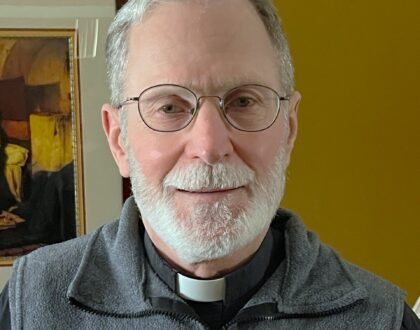Homily, 3rd Sunday of Lent – March 12, 2023

From The Pastor
Conversion can be a push-pull game of come close but not too close. Most want the benefits of conversion felt in new movements of self-acceptance, letting go of negative memories of the past, and realizing truth-based relationships going forward. We are not quite so fond of the vulnerability and the fear this process can stir up in our desire for greater freedom with God, self, and others.
The story of the Samaritan woman captures all of this and more. This woman is a snapshot of many of us. Her story is a kind of frame through which we can look at our story and imagine how such an event might impact us. So many can relate to her life circumstances with empathy and compassion because in one way or another we can see ourselves in the picture. If not literally, we are drawn to the engagement of Jesus who is the giver of ‘living water’ as he reveals that God will be worshipped in Spirit and in truth.
The action of the story is progressive. First, we notice that Jesus is not hindered by social or cultural boundaries. He knows he is not to speak to a woman in public or engage with a Samaritan. He sees neither. Jesus sees a woman in pain who holds a seed of faith that he intends to draw out. Jesus is not put off by her snarky resistance. He recognizes her fear and discomfort in being vulnerable.
Isolated as the woman may appear, she is not ignorant socially or religiously. She knows her history and holds her place before God as a Samaritan Jew. The social division between the Jewish sects began six hundred years previously at the time of the Babylonian exile. As such, the point of the story is not only her personal conversion, but an image and invitation for the universal conversion of all who seek God in the hope of a coming Messiah.
The scene opens as you might expect. Jesus purposely asks for a drink. The woman’s response is resistant and snarky. She rather sharply points out to him that he is not to speak to her. Jesus is seeking more than social niceties as he reveals his deeper intention. He is calling her to faith which will lead to her freedom. “If you knew the gift of God…you would ask and he would have given you living water.” Still resisting, she is thinking of flowing or running fresh water. Jesus bides his time as he prepares his approach.
He makes his point clear trusting she will catch on. “…the water I will give will become a spring of living water welling up to eternal life.” Conversion is not simply an activity of human interest for personal betterment. Conversion is an awakening to the action of God’s grace that inspires living faith. Living faith grows from the living waters of Baptism. Living faith is a maturing relationship with the living God that is real and personal.
Now the woman wants the water, but only to satisfy her ongoing thirst. Jesus is thirsting for her soul. To reach her soul, he must free her heart from the wounds and losses of the past. This is another layer we all face in the movements of conversion. Surrendering the hurt and losses of the past frees the heart to accept God’s healing grace. Jesus must take a risk as he seeks to free her from painful memories of hurt, loss, abuse, or shame.
“Go call your husband and come back.” That kicked it up a notch. Her resistance and defense thicken as she denies her previous engagements. She now sees Jesus as a Prophet and the conversation turns to God and worship. The religious tension surfaces again as they wrestle with where God should best be worshipped. Jesus makes his point clear: “…true worshipers will worship God in Spirit and in truth.”
Notice the empathy and compassion of Jesus. He was not soliciting a confession for past sins, but releasing past hurts that the woman may realize the true nature of God. Where God is worshipped does not matter. True worship is from the heart through the Spirit that reveals the truth. And what is the truth?
The woman knows of and hopes for a coming Messiah. How and when is not clear, but she has hope. Now it is Jesus who reveals the truth of God in the Spirit to the woman. “I am he, the one speaking to you.” This is a personal and unique revelation Jesus shares with the woman. He wants her as his own in faith and love.
This interaction makes clear that true conversion is an action of God. The woman not only found personal freedom, healing, and a new identity going forward, she also came to faith in the true Lord Jesus. The effect is clear. She immediately goes and shares her experience with the townspeople. Her social isolation is gone. She wants others to encounter the same power she received in the words and actions of Jesus.
What in the story most strikes you? What tones of resistance, vulnerability, or past hurts are stirred? Does the story inspire your faith? Are you able to worship freely in Spirit and in truth secure in the love and mercy of the Lord Jesus?
Father John Esper
Recent Sermons

Homily, March 30, 2025
March 27, 2025

Homily, March 23, 2025
March 20, 2025

Homily, March 16, 2025
March 11, 2025

